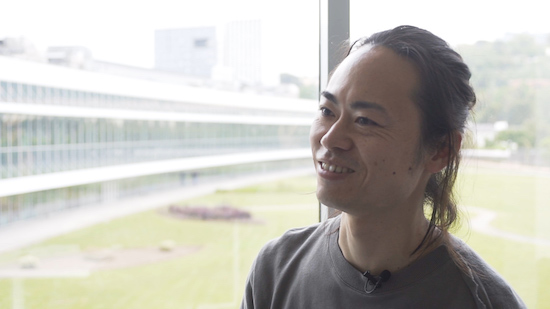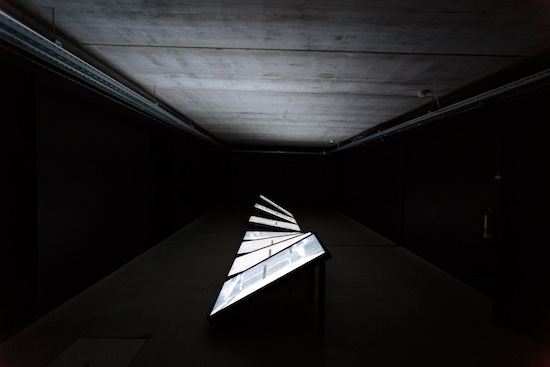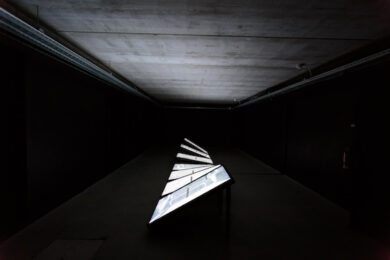An idyllic stoney square in Portugal’s third-largest city isn’t necessarily the place you’d expect to find a multi-channel, audio-visual installation inspired by cutting edge nanotechnology. A quick duck out of the sun, and into the GNRation cultural centre in the centre of Braga though, and you’ll come face to face with just that. The latest exhibition by acclaimed Japanese artist, Ryoichi Kurokawa, inhabits a small dark room inside the multipurpose space, full of exhibitions and often host to gigs from the like of Laraaji or Earth vs. The Bug. It’s like stumbling across the bridge of an abandoned spacecraft amid ancient Roman ruins, swapping out blazing sun and warm paving stones for a psychedelic strip of striking futurist sight and sound.
Seven screens lie face-up in a row in the middle of the floor, cresting one-by-one through a see-saw wave – only the central screen is lying entirely flat; the first and last sit at opposing 45 degree angles. While the seven large and long screens flicker and flutter with teeming swarms of data, visualised as abstract lines, shapes, and visual static, four speaker channels crackle and boom in kind from each corner of the room.The source material comprises a variety of data, images, and code provided by scientists from the International Iberian Nanotechnology Laboratory (INL) – a project located in Braga researching the “application of nanoscience and nanotechnology”.
“It’s a unique collaboration between art and science,” explains Kurokawa, speaking from his home in Berlin. Previously the artist’s work has been shown far and wide, exhibited or performed at the Tate Modern in London, at the Venice Biennale, at Montreal’s Mutek, and Barcelona’s Sónar to name but a few locations, but this is Kurokawa’s first collaboration with INL. “We took advantage of the fact that one of the world’s leading nanotechnology laboratories is located in Braga to create an artist-in-residence program, merging cutting edge nanotechnology research and world-class artists.”
The abilities of nanotechnology to look at the world in such minute detail doesn’t just have scientific implications. This is where the umbrella project under which Kurokawa’s ad/ab Atom installation falls gets its name: ‘Scale Travels’. While there’s a huge disparity between the layman’s understanding of nanoscience and the complexities of Kurokawa’s processes – of the ins and outs of reinterpreting data and code as visualisations and electronic thuds, bleeps, and buzzes – the effective properties of nanoscale systems are unmistakably potent. It’s a dizzying experience being confronted by the nanotechnology inside the space, particularly when filtered through the countless possible visualisations and sonifications of digital processes wielded by Kurokawa. A lattice of monochrome networks across the screens, resembling something between neural pathways, cosmic star maps, or aerial views of busy traffic. The screens constantly appear as if glitching, while the images and punctuating sounds shift and mutate too fast to follow without anything other than the deepest concentration. There’s no discernible narrative to what’s going on on the array of abstract electronic displays – although a countdown timer drops down semi-threateningly across all seven screens throughout each looped performance.
Kurokawa created the imagery and animations through a mixture of contrasting processes. He digitally reconfigured code provided by INL scientists into a series of 2D and 3D images. In contrast, Kurokawa also took images taken using INL’s electron microscopes and analysed them to find nanostructures, which were then reinterpreted to form new processes giving shape to the motion of the visuals.
“I tried to set out to travel into an atomic space where the viewers could experience a distorted and highly magnified world,” states Kurokawa. “I collaborated with astrophysicists to create another art piece on stellar formations some time ago, but for this piece the scale is the complete opposite. It was a great opportunity for me to treat both micro- and macro-scientific materials in creating different works.”

Besides his installation and exhibition works, Ryoichi Kurokawa has the unusual distinction of having performed live and released music as a musical artist – back in 2004 he even released a record via Daisyworld, a label run by Haruomi Hosono of Yellow Magic Orchestra. In 2014 Kurokawa also played at Semibreve Festival, also held annually in Braga and loosely linked to the GNRation space. Kurokawa performed in the vast Theatro Circo on a bill that included Demdike Stare and patten, and subsequent bills have been no less impressive, including the likes of Lawrence English and GAS. What’s more, the city was recently attributed the title of a UNESCO Creative City. According to GNRation’s programming director Luís Fernandes, Braga itself is certainly having something of a moment when it comes to multimedia art.
“People are curious and eager to see interesting artworks here,” Fernandes says. “We also develop the relationship with the community on several levels, especially in terms of education. We have a ongoing program of workshops with school-aged children, audiovisual shows for babies, masterclasses and workshops for adults, etc. It’s a fruitful synergy for sure, and it’s all building up interest in this area.”
Beyond Kurokawa’s installation, the myriad futuristic works going on in the GNRation space, the deeply scientific Scale Travels collaboration with the INL (even the Semibreve experimental music festival), they’re all not quite as alien as one might think from the historical town they call home. Kurokawa is clear that the laws of physics, and thus the laws of nature, form the basis of his work. It’s all just a matter of perspective – or perhaps more aptly, a matter of scale.
Ryoichi Kurokawa, Scale Travels: Ad/ab atom, is at GNRation, Braga, Portugal, until 20 January



